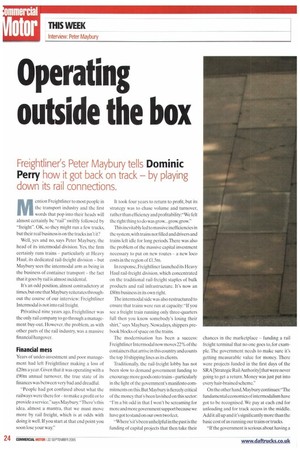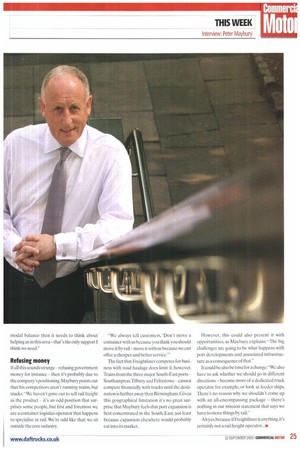Operating outside the box
Page 24

Page 25

If you've noticed an error in this article please click here to report it so we can fix it.
Freightliner's Peter Maybury tells Dominic
Perry how it got back on track — by playing
down its rail connections.
Mention Freightliner to most people in the transport industry and the first words that pop into their heads will almost certainly be "rail" swiftly followed by "freight". OK, so they might run a few trucks, but their real business is on the tracks isn't it?
Well, yes and no, says Peter Maybury, the head of its intermodal division. Yes, the firm certainly runs trains — particularly at Heavy Haul, its dedicated rail-freight division — but Maybury sees the intermodal arm as being in the business of container transport — the fact that it goes by rail is almost incidental.
It's an odd position, almost contradictory at times, but one that Maybury reiterates throughout the course of our interview: Freightliner Intermodal is not into rail freight.
Privatised nine years ago, Freightliner was the only rail company to go through a management buy-out. However, the problem. as with other parts of the rail industry, was a massive financial hangover.
Financial mess Years of under-investment and poor management had left Freightliner making a loss of £20m a year. Given that it was operating with a £90m annual turnover, the true state of its finances was between very bad and dreadful.
"People had got confused about what the railways were there for— to make a profit or to provide a service." says Maybury. "There's this idea, almost a mantra, that we must move more by rail freight, which is at odds with doing it well. If you start at that end point you soon lose your way." It took four years to return to profit, but its strategy was to chase volume and turnover, rather than efficiency and profitability:"We felt the right thing to do was grow... grow, grow."
This inevitably led to massive inefficiencies in the system,with trains not filled and drivers and trains left idle for long periods. There was also the problem of the massive capital investment necessary to put on new routes — a new loco costs in the region off 1.5m.
In response, Freightliner launched its Heavy Haul rail-freight division, which concentrated on the traditional rail-freight staples of bulk products and rail infrastructure. It's now an £80m business in its own right.
The intermodal side was also restructured to ensure that trains were run at capacity: "If you see a freight train running only three-quarters full then you know somebody's losing their shirt," says Maybury. Nowadays, shippers prebook blocks of space on the trains.
The modernisation has been a success: Freightliner IntermocIal now moves 22% of the containers that arrive in this country and counts the top 10 shipping lines as its clients.
Traditionally, the rail-freight lobby has not been slow to demand government funding to encourage more goods onto trains—particularly in the light of the government's manifesto commitments on this. But Maybury is fiercely critical of the money that's been lavished on this sector "I'm a bit odd in that I won't be screaming for more and more government support because we have got to stand on our own two feet.
"Where's it's been unhelpful in the past is the funding of capital projects that then take their chances in the marketplace — funding a rail freight terminal that no one goes to, for example. The government needs to make sure it's getting measurable value for money. There were projects funded in the first days of the SRA [Strategic RailAuthority] that were never going to get a return. Money was just put into every hair-brained scheme."
On the other hand,Maybury continues:"The fundamental economics of intermodalism have got to be recognised. We pay at each end for unloading and for track access in the middle. Add it all up and it's significantly more than the basic cost of us running our trains or trucks.
"If the government is serious about having a modal balance then it needs to think about helping us in this area the only support I think we need."
Refusing money If all this sounds strange-refusing government money for instance then it's probably due to the company's positioning. Maybury points out that his competitors aren't running trains, but trucks:"We haven't gone out to sell rail freight as the product it's an odd position that surprises some people, but first and foremost we are a container logistics operator that happens to specialise in rail. We're odd like that; we sit outside the core industry. "We always tell customers. 'Don't move a container with us because you think you should move it by rail-move it with us because we can offer a cheaper and better service."
The fact that Freightliner competes for business with road haulage does limit it, however. Trains from the three major South-East ports Southampton,Til bury and Felixstowe-cannot compete financially with trucks until the destination is further away than Birmingham. Given this geographical limitation it's no great surprise that Maybury feels that port expansion is hest concentrated in the South-East, not least because expansion elsewhere would probably eat into its market. However, this could also present it with opportunities, as Maybury explains: "The big challenges are going to be what happens with port developments and associated infrastructure as a consequence of that."
It could be also be time for a change:"We also have to ask whether we should go in different directionsbecome more of a dedicated truck operator for example, or look at feeder ships. There's no reason why we shouldn't come up with an all-encompassing package there's nothing in our mission statement that says we have to move things by rail."
Ah yes,because if Freightliner is anything,it's certainly not a rail freight operator...•










































































































































































































